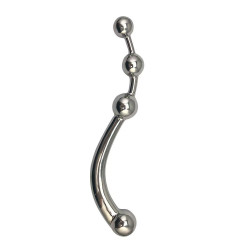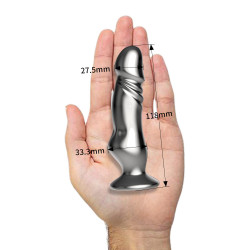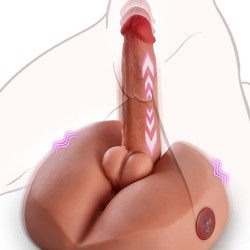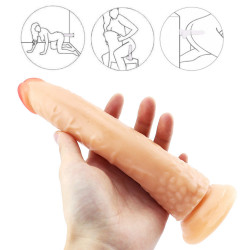On Top: How to Be a Dominant
As a Dominant, make the most of your abilities!
I'll admit that I let the situation get the better of me the first time I ever found myself in a bedroom with an eager female, surrounded by rope. She was anxious to please me. I was twenty, and I had no prior experience with rope play or pretending to be "in control" of a kinky situation. As a result, we spent a lot of time feeling hot and bothered by the idea of playing enslaver and enslaved person and very little time discussing scenes and expectations. Or, in my imagination, victim and kidnapper.
She looked at what should have been a pleasurable scene for around five minutes before she stopped fidgeting, developed a flat expression, and sighed. "This isn't how I pictured it," she responded when I asked her what was wrong. After saying, "I wanted," she briefly described a fantasy she had had since she was a youngster. My fantasy, which I had harbored simultaneously, was the opposite. Overcome with embarrassment, we sat there, me feeling like the jerk in the room because I hadn't stopped to ask her what she wanted, and she was being constrained by some pretty awful knots. Because no one dared to say up, we blushed, laughed, and plunged into something far more intense than our emotional capacity could manage, which ultimately destroyed the relationship.
What's the lesson here? Interaction.
Placing excessive emphasis on expectations and fantasies without pausing to discuss, confer, or even pay attention to the other person is one of the "traps" linked with being dominant in a relationship (which can be a common pitfall with a rookie Dom). When we think "Dominant," we instantly imagine having power, controlling others, and exercising those desires without realizing that we are not the only people here, that we are not an absolute master, kidnappers, or anything else. However, somehow, that can get lost, and we believe that "Dominant" means that the other person is merely a changeable prop we are using. Even worse, when that individual objects—in this case, a perfectly valid, if not significant, gesture—we may become enraged and respond accordingly.
Lesson One: The Dominant Is Not (Really) In Charge
This isn't how things have to be. Never, ever, especially not with someone with enough faith in you to let you be "in charge" of a scene or fantasy. Because it needs to be reiterated repeatedly: you are not in charge as a dominant. You are, at most, a co-author of this tale. You must, therefore, be as conscious of your lover as you are of yourself.
Avoid being a dick. Use one, of course, but don't degrade yourself by attempting to navigate a vast sea of genital output like a thin boat. Alternatively said, "Don't be a douche canoe." Really.)
We say this because it's simple to power trip as a Dominant during a scene, and you might experience altered states (also referred to as top-space, subspace, and room-space, among other things). At this point, the power dynamic is crucial. Your potency and pleasurable experience as a dominating come from playing that role. However, being dominant goes beyond simply beating people and claiming to be a Master or Mistress. Being dominant may involve none of the conventional components of dominating play; instead, it can manifest as a gaze, a facial expression, a deep inhale, or a choice of words that convey strength, authority, and power.
Generally speaking, though, communication comes first. A competent dominator is aware of when to listen when to act, and when to back off. This is as, if not more, significant to you as it is to the person you are in the moment with. At least for the scene's duration, the Dominant must maintain authority over the scene and themselves. Your play partner is the individual who trusts you to be a safe person and provides a secure environment for them to express their joys, sorrows, desires, and shadows. They have faith in your ability to manage yourself.
Self Control and Safety as a Dominant
Safety is the first factor to be taken into account.
The submissive partner, often referred to as a bottom or by another name, is entrusting you with their bodily protection, which is the evident aspect of safety in kink and sex in general. (And believe me, it comes with a whole cluster of euphoria, dread, and power-triggered arousal. You can, and probably will, feel uncomfortable, anxious, worried, and afraid even as a Dominant. This is typical. Believe me. You will ultimately experience it.)
Has the topic of safer sex and contraception come up? How can the scene be as physically secure as feasible within those parameters and within that context, and what tools will you use for this scene? The Dominant must remember to check in frequently during the scene using the established safewords and other communication channels before the rope is taken out of its bag, even though both partners are accountable for ensuring the scene goes faithfully and correctly. (Really, you need to know how to conclude a scene before attempting to set it. Even when a ball gag is being used, communication is crucial.) If both of you lose sight of what you are doing, things may rapidly go south. Once the scene starts, emotions run high, endorphins rush through your veins, and you are both engrossed in your parts. You have to be completely conscious of what you do and how your spouse responds as a dominant. Always.
Additionally, safety scissors should be available in case either partner experiences limb circulation issues or needs to be cut or untied right away, such as in the event of bondage play.
The terms "safe, sane, and consensual" may be familiar to you when discussing kink. That's a fine one. However, I'd like to utilize our guiding slogan, RACK, in its place.
Danger-aware consensual kink, or RACK, is a term frequently used to characterize circumstances when a certain amount of danger is known. It's possible that your playmate has autism or is receiving therapy for depression. They may occasionally experience panic attacks, and even if they are excited to play, you want to discuss what to do if they suddenly start experiencing panic attacks during recreation. Or, more obviously, you can have an old foot injury or back pain that you need to manage. There are other risks as well; when hot wax, rope, or flogging are involved, where pleasure and pain are mixed, it's easy to lose sight of the reality that you are hurting someone to experience ecstasy. There is a line that is very easily crossed.
The RACK approach also takes into account sexual risk, which includes hazards like STIs or pregnancy, as well as the impact of prescribed antidepressants. While it's not that you can't engage in kink, any risks should be discussed and minimized. It's up to you and your partner how you talk about this and what you decide to do. Sometimes, a brief exchange of words is sufficient; other times, a more extended discussion is required; and still, a continuous dialogue is required. This connects to the second idea.
Dominants: Know Thyself
The second is personal: the potential Dominant needs to be conscious of themselves.
Although skills and limits awareness seem obvious, my girlfriend Lily handled her tools clumsily in her early days as a Dominant because she was terrified of them (she carried baggage related to gender roles and bondage). She became a lot more capable Dominant; however, after she worked through her feelings about WHY, she was inappropriately using her tools. Her habit of first handling her equipment—for example, by feeling how the rope holds knots when tied to her arm or wrists—before transferring the untested rope to her partner during play was also beneficial. However, we have observed potential dominants who believe that all it takes to be dominant is to yell at or threaten your partner and to use tools like a gag, rope, or chains. Everybody has read about a specific trashy fiction arguing that cable ties and chains are beneficial. No, they aren't. And a seasoned Dom will be aware of this. They will know and feel at ease using their tools and toys. They will pay attention to their subs and behave in a way that suits them. Yes, dominators have the right to yell at their partners, but only within the parameters that the partners have agreed upon.
This holds for flaws in the same way as dominants are aware of their abilities and limitations. Dominance also includes all of that. As the saying goes, "Know thyself." To best provide for, give to, and nurture their subordinates, a dominant should, at the very least, be on the path to understanding themselves and their desires. Having all the answers is unnecessary if you want to become a dominant force, but you must be prepared to investigate your baggage's origins and how to address it. You must accept accountability for your deeds. Are you going to make mistakes? It's inevitable for people to make mistakes along the way; you're a human. That is a component of leveling up and accumulating experience.
This implies that you should also talk to potential partners about any risk factors or rigid boundaries you may have. In a relationship, being dominant does not mean your partner lacks autonomy or authority. How would you fare if you were ill? In a medical facility? Do you want your significant other to be able to look you in the eye and tell you that something is off or that they are offended by something you said or did? If the submission also takes place outside of the bedroom, does the submitting partner have the authority to decide whether to contact you after you, send you a card, or pay any debts you share? Is there a procedure or custom to handle the situation if you cannot attend a play date due to illness? Do you and your partner feel safe following a specific protocol? If spending time with the submissive does not benefit both of you, does the submissive have the right to leave you for another dominant?
All People Do D/s a Bit Differently
As a Dominant, the third important thing to remember is that everyone is unique.
Two dominants are nevertheless two different individuals even if they have identical tools (for example, both employ flogging) and comparable backgrounds. Despite using the same tools, dominance, and submission play can take various forms, and dominants have distinct styles. What annoys one person might not annoy another. One person's hard limit might not be a problem for another, and so on. That means you must start from scratch regarding communication and self-reflection with each partner you play with.
The Dominant's name and possible language are two examples of variance. The phrase may have a specific meaning, and some Dominants prefer to be addressed using specific terms. For instance, whether in a scene or discussing a scene, a dominant partner may insist on being addressed as "Sir" and capitalize the initial letter to indicate the power dynamic symbolically. Another Dominant might be "Jane," while another would use a title rather than their given name in a scenario. Some Dominants are pretty aware of how specific names could be laden with racial supremacist overtones and/or gender conventions and expectations. "Master" and "Mistress" might have rather diverse meanings. Therefore, examining those titles and how people feel about them could be helpful. Do you want to use "Ser" instead of "Sir" because you think the latter is too masculine? Yes. Do you genuinely enjoy being referred to as "Your Majesty"? Feel free to proceed. Not interested in using an honorific at all? Yes. Be the amazing person you are.
This also applies to tools. It does not follow that all dominants who utilize a specific tool choose the same strategy just because one dominant may use it. For instance, Alexis and I both use rope. However, Lily acts tough but tender when she is in charge and prefers to wear more attractive ties. Let's say there's something more primordial when I'm in charge. We must understand each other, discuss what works for us, and learn how to treat one another in scenes. Dominance is a dynamic state of affairs. It entails constant dialogue, introspection, and adaptation.















































